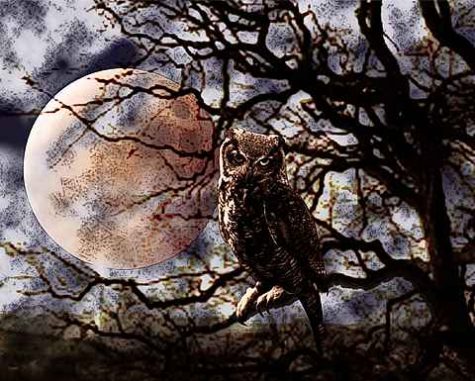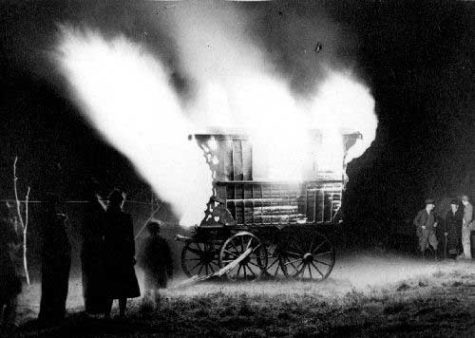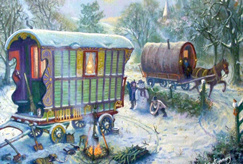Funeral
For Peace At Someone’s Death
For Gypsies there is far more concern for the living than for the dead. Yet the Rom believe there must always be a family vigil prior to the death of a family member. After the death there will be the funeral, which must be followed by a proper period of mourning.
English Gypsies believe that the owl is a harbinger of death. If they hear an owl hooting away in the distance, then it means someone close to them will die. If the owl is close by, with its cries loud and clear, then the person who will die is distant.
When an elderly member of the tribe is ill, and certain that he or she is going to die, work is sent out to all family members whereverthey happen to be scattered. They will immediatly return home, no matter from how far, for this is the one event that takes precedence over all others. The family members gather around the dying person’s bed, or outside around the tent or vardo.
There is always someone seated at the bedside until the death. It is a time for much socializing, with very little emotion shown regarding the dying man or woman.
Once dead, the person is caught between the world of the living and the world of the dead. He or she will stay there until buried. In order to ease the stay there, and to prepare them for the transition to the world of the dead, there is a simple ritual that is sometimes performed by the shuvani(often without the knowledge of any of the other members of the tribe).
A small fire is lit – quite separate from any cooking fire – as soon as possible after the last breath. The fire should be laid carefully so that it can be started with one light and so that it will burn for a sufficient time without having to have more fuel added. Onto the fire are thrown thyme, sage, and rosemary, in that order. The dead person’s name is chanted repeatedly as the shuvani walks backwards (widdershins, or counterclockwise) seven times around the fire, which is then left to burn itself out.
From Gypsy Love Magick
Art by Ann Falcone
Gypsy Funeral
At one time, it was commonly believed that just as the body is a vehicle for the spirit on earth, the vardo is the vehicle for the body on earth. When someone died, their vardo and most of their possessions were burned because their “vehicle for the body” was no longer needed.
Funerals are a very important rite of passage for the Gypsy Traveler community. When a Gypsy dies it is usual for a vigil to be kept over the body, which is kept illuminated until after the time of the funeral. The deceased is usually buried with the owner’s intimate personal possessions such as jewelry and trinkets.
Some Gypsy funerals will attract people from all over the country to pay their respects and floral tributes are usually on a grand scale. Personal items belonging to the deceased such as clothing, bedding and china are usually burnt or destroyed after the funeral. Many years ago, the wagon was very often burnt as well, but this is rarely done today.




